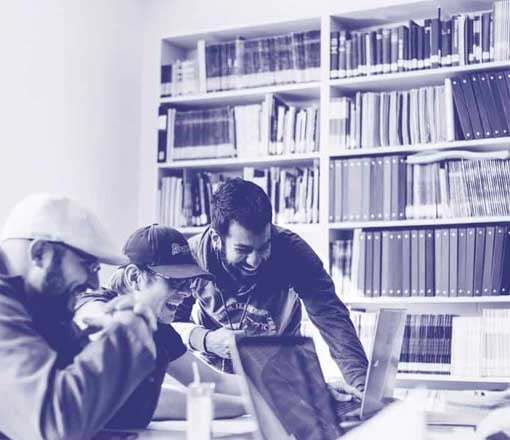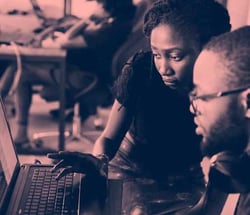This blog post is co-written by Eoin McDonnell, Integrated Learning Strategy Director at The Creative Engagement Group, a parent company of Logicearth.
Unlearning’ as a concept has proved controversial among the Learning & Development community for many years. Futurist scholar Alvin Toffler said in his 1970 work Future Shock, that “by instructing students how to learn, unlearn and relearn, a powerful new dimension can be added to education… Tomorrow's illiterate will not be the man who can't read; he will be the man who has not learned how to learn.” (Toffler 1970, 414). But what does it mean to unlearn? Is it a useful concept? If so, how might you use it in your own learning and development programmes?
We asked experts for their thoughts on ‘unlearning’ on social media, with many arguing that unlearning is physiologically impossible because we can’t just erase previous knowledge from our brains, or deliberately forget it. Some suggested that we are really just pushing existing knowledge into the background of our minds or overwriting it with new understanding. So not ‘unlearning’ but simply ‘learning’.
Perhaps it’s all about how we define unlearning. CEO of ‘Shift Thinking’ Mark Bonchek says that unlearning is not about forgetting or erasing knowledge, but “about the ability to choose an alternative model or paradigm…when we unlearn, we step outside the mental model in order to choose a different one.” In other words, unlearning is about being open to new ways of thinking, and also about consciously choosing a new path of learning when the old one is no longer serving us. If we define unlearning in this way, it opens up opportunities for us to engage with new learning processes and interventions. To use a gardening analogy, we’re cutting back parts of a tree, enabling it to regrow stronger and in the right way.
For us at Logicearth, this is a potentially useful concept, because to unlearn in this way requires the ability to adapt to new learning processes and a clear rejection of those which are not working. Here are two examples from our own experience.
Helping people to make a deliberate intervention to dismantle unwanted behaviours
Eoin considers this an example of unlearning: “I’m a distance runner and needed to change my running style to improve my performance and reduce injury. After studying resources (running books), talking with experts (other runners), using performance support tools (my Garmin watch), understanding ancillary skills (nutrition), and maintaining a training plan (that evolves constantly as I do), I’ve moved from a heel strike style to a midfoot strike. I can see on my watch that my heart rate is down, my speed is up (meaning that I am running with greater efficiency) and I also get fewer impact injuries. I couldn’t ever go back to my old running style now, not because I have learned the benefits of this new way of doing things, but because my old style simply isn’t there for me to return to. I have ‘unlearned’ it.’’ For Eoin, this isn’t about building new behaviours on top of unwanted ones; he has torn up the foundations of his running skills and put better foundations in place, by consciously replacing a way of doing things that wasn’t working with a better way. He has unlearned the behaviour that wasn’t benefitting him.
Helping learners to recognise habitual and unconscious errors
Mark Bonchek’s article says that “the place to start is by unlearning how we think about learning.” It’s about adapting our thinking and learning processes to the situation to change unhelpful behaviours.
Richard’s example is from language learning, related to something known as ‘fossilised errors’. They are notoriously difficult to correct as they have become a part of someone’s typical language use. “I live in Spain and have worked with a language coach in the past to improve my fluency in Spanish. I would often make mistakes during conversation, such as mixing up the gender of certain irregular nouns (Spanish nouns are masculine or feminine). My coach, Cristina, identified a series of typical mistakes I was making, and I wrote a list of these on the whiteboard in my office to help remember them. Then Cristina would correct me directly during our discussions. As time passed, I made fewer and fewer errors and she would just give me a look, and I’d correct myself, on the occasions I slipped up.”
These ‘fossilised errors,’ are habitual mistakes, made in the moment and repeated out of habit, even when we know they are wrong. Richard was helped to recognise and analyse the problem but really had to keep working on it and receive strong, consistent feedback to change and unlearn that ingrained behaviour.
The concept of unlearning can encourage people to analyse and assess their own behaviours
Security expert Daniel Gormley suggests that ‘unconscious competence,’ viewed by many as the highest point of our cognition process, where we are able to do something correctly without thinking about it, could actually be dangerous. He argues it can lead to “complacency, or a lack of challenge to the decision-making process.” Building in frequent checks on knowledge into your learning programme, which force learners to consciously question what they are doing, is vital. Through a process of reflection, experts can continuously analyse their methods and behaviours to determine whether what they are doing is still the best thing, or whether they need to leave the well-trodden path and find a new way.
In the workplace, there are many habits and behaviours that may be affecting people’s ability to do their jobs, leaders’ ability to lead and the ability of teams to collaborate effectively. When learning programmes are designed to prompt behaviour change, a focus on unlearning may benefit the ongoing process of developing different approaches and behaviours.
As a result, while unlearning may be a controversial concept, if we view it as an opportunity to lay new foundations for more effective behaviours and to stop acting in ways that are not helpful for us, then the concept could have traction for L&D teams. So, whatever your next L&D experience – whether it’s reskilling your team, providing cross-functional learning solutions, or supporting strategic change across the organisation, it might just be worth incorporating some unlearning.
Reference
Toffler, A. (1970). Future Shock. New York, NY: Amereon Ltd.
Interested in a learning strategy that works? Talk to us today.







Was this article helpful?